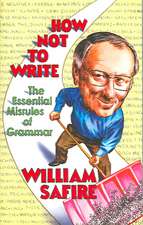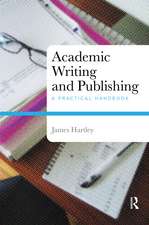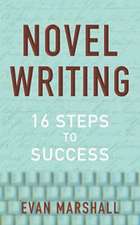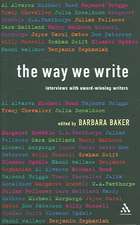Negotiating the Personal in Creative Writing: New Writing Viewpoints, cartea 6
Autor Carl Vandermeulenen Limba Engleză Paperback – 31 iul 2011
Preț: 259.42 lei
Nou
Puncte Express: 389
Preț estimativ în valută:
49.65€ • 51.64$ • 40.99£
49.65€ • 51.64$ • 40.99£
Carte tipărită la comandă
Livrare economică 14-28 aprilie
Preluare comenzi: 021 569.72.76
Specificații
ISBN-13: 9781847694379
ISBN-10: 1847694373
Pagini: 256
Dimensiuni: 150 x 206 x 15 mm
Greutate: 0.34 kg
Ediția:New.
Editura: Multilingual Matters Limited
Seria New Writing Viewpoints
ISBN-10: 1847694373
Pagini: 256
Dimensiuni: 150 x 206 x 15 mm
Greutate: 0.34 kg
Ediția:New.
Editura: Multilingual Matters Limited
Seria New Writing Viewpoints
Cuprins
Introduction: Negotiating the Personal and Interpersonal 1: Considering Where We're Coming From 2: The Workshop: "More or Less Unfortunate Misunderstandings"3: Reflection and the Dialogic Self 4: Response in Writers' Groups 5: Teacher Response to Student Writing 6: Negotiating Authority as Teachers, Models, Mentors 7: Problems and Crises in Relationships 8: Resolving Dilemmas of Grading 9: Constructing the Practice and Identity of Writer
Recenzii
Negotiating the Personal in Creative Writing is a brave and far-reaching addition to the New Writing Viewpoints series. Carl Vandermeulen tackles some of the stickiest issues in creative writing pedagogy, including grading, the position of the self, and how sometimes the best of plans goes awry. Negotiating the Personal in Creative Writing thoughtfully posits who we think we are, what works in our undergraduate classrooms, and what we must reconsider. This book contains a wealth of honest experiences and useful ideas, from effective workshop questions to the three writing selves to writers' groups to solitude, research, and memorization.Anna Leahy, editor of Power and Identity in the Creative Writing ClassroomCarl Vandermeulen's Negotiating the Personal in Creative Writing is a sensible, useful synthesis of the last decade's meditations on how to teach creative writing. He offers real advice for teaching reflection, response, critique and mentorship, drawing on the collective expertise of many creative writing teachers. Any teacher of creative writing will recognize themselves in this book; any good teacher of creative writing will find something new to try in their own classrooms, and good reasons for doing so.Robert E. Brooke, University of Nebraska-Lincoln, USA






















